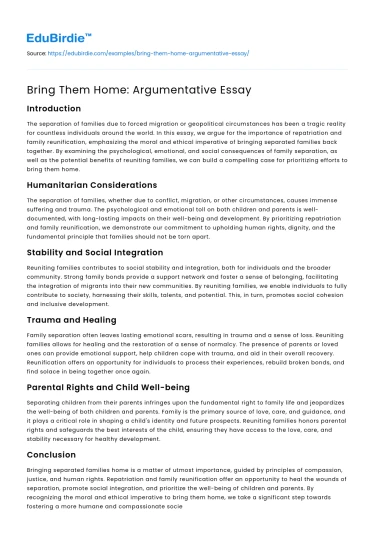Introduction
The separation of families due to forced migration or geopolitical circumstances has been a tragic reality for countless individuals around the world. In this essay, we argue for the importance of repatriation and family reunification, emphasizing the moral and ethical imperative of bringing separated families back together. By examining the psychological, emotional, and social consequences of family separation, as well as the potential benefits of reuniting families, we can build a compelling case for prioritizing efforts to bring them home.
Humanitarian Considerations
The separation of families, whether due to conflict, migration, or other circumstances, causes immense suffering and trauma. The psychological and emotional toll on both children and parents is well-documented, with long-lasting impacts on their well-being and development. By prioritizing repatriation and family reunification, we demonstrate our commitment to upholding human rights, dignity, and the fundamental principle that families should not be torn apart.
Save your time!
We can take care of your essay
- Proper editing and formatting
- Free revision, title page, and bibliography
- Flexible prices and money-back guarantee
Stability and Social Integration
Reuniting families contributes to social stability and integration, both for individuals and the broader community. Strong family bonds provide a support network and foster a sense of belonging, facilitating the integration of migrants into their new communities. By reuniting families, we enable individuals to fully contribute to society, harnessing their skills, talents, and potential. This, in turn, promotes social cohesion and inclusive development.
Trauma and Healing
Family separation often leaves lasting emotional scars, resulting in trauma and a sense of loss. Reuniting families allows for healing and the restoration of a sense of normalcy. The presence of parents or loved ones can provide emotional support, help children cope with trauma, and aid in their overall recovery. Reunification offers an opportunity for individuals to process their experiences, rebuild broken bonds, and find solace in being together once again.
Parental Rights and Child Well-being
Separating children from their parents infringes upon the fundamental right to family life and jeopardizes the well-being of both children and parents. Family is the primary source of love, care, and guidance, and it plays a critical role in shaping a child's identity and future prospects. Reuniting families honors parental rights and safeguards the best interests of the child, ensuring they have access to the love, care, and stability necessary for healthy development.
Conclusion
Bringing separated families home is a matter of utmost importance, guided by principles of compassion, justice, and human rights. Repatriation and family reunification offer an opportunity to heal the wounds of separation, promote social integration, and prioritize the well-being of children and parents. By recognizing the moral and ethical imperative to bring them home, we take a significant step towards fostering a more humane and compassionate society, where families are kept intact, and the bonds that unite us are cherished and protected.






 Stuck on your essay?
Stuck on your essay?

